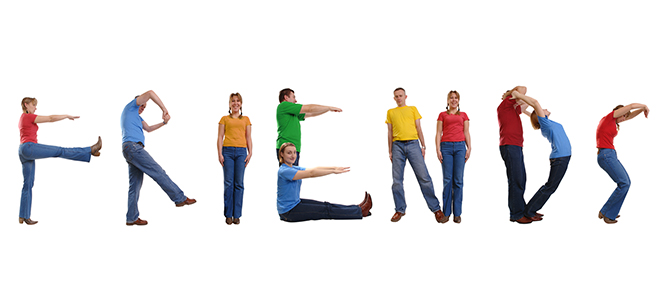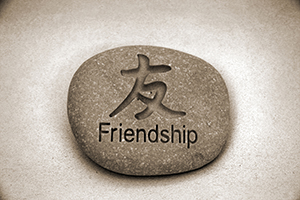THE IMPORTANCE OF FRIENDSHIP

By Dr. Peter E. Kalellis
As we enter the New Year 2017, each one of us feels it is time for a new beginning, and new beginnings promise something better and good. New York Lifestyles Magazine, to enrich the lives of its many readers, will feature a series of articles about the concept of friendship. So for our new beginning, let’s consider the following lines and visualize the potential and importance of friendship.
True friendship is a kind of divine act that enables two people to share their thoughts and feelings that life may deny them. Real friendship is an inner feeling, an awareness known when two people can be together and share thoughts, feelings, experiences, ideas without evaluations, criticism or judgments, at the risk of exposing their human vulnerability.
TO GIVE AND RECEIVE
Friendship is not a luxury, it is a spiritual opportunity, not necessarily religious that helps us grow in grace and wisdom. It implies loving, sharing, caring and learning to give and to receive. Caring for each other means that souls connect to create a climate of reciprocity and concern for each other’s wellness. As we reach out and find a friend with whom we can interact honestly and warmly; such relationship will give us a new and better dimension about ourselves.

When two people do interesting and helpful things for each other, more feelings of friendship are generated. Unlike acquaintances, friendships are a form of unwritten contract. Friends usually enter into an unspoken agreement that they will respond toward each other in generally honest and kind ways. They will be pleased to see each other; they will support each other when either is threatened; they will be available for discussions; they will publicly admit their friendship; they will have each other’s best interests at heart; they will attempt to share each other’s joy and sorrow. Above all, they will be predictable and loyal with the confines of their friendship. Friends are better than the stars. The stars in the sky shine only during the night. But true friends shine day and night by their behavior and response to friendship.
ACCEPTANCE IS KEY
When a friend is different from you in likes and dislikes, goals and aspirations, personality traits, it’s nice to observe the difference without judgment. You may learn from frequent contact with that person that good friends agree to disagree. What is of essence is that there is a real desire to understand each other. Accept your friend with his/her flaws. It may be that in the course of interaction, your friend’s virtues may transcend the shortcomings. And it may be foolish to be irritated at a few blemishes, forgetting our own. It’s hard to change other people that you may like, but you can always change yourself so they may like you. You can then solve the otherwise unsolved problems in friendship.
True friends don’t desert each other when one is facing trouble. They would face it together and support each other, even if it is against the interests of the other person. Best friends don’t analyze each other; they don’t have to do so. They accept each other with their positive and negative qualities. Nothing is hidden from true friends. They know each other’s strengths as well as weaknesses. One would not overpower the other. They would respect each other’s individuality. In fact, they would understand the similarities and respect the differences. Best friends are not concerned about any outsider who criticizes their friendship. At best, they can ignore or walk away from people who criticize their friendship.
A SPECIAL BOND
Most of us wonder what is the real meaning of the saying “A Friend in Need is a Friend Indeed”? The trust between best friends is such that if one friend falls in trouble, the other will not think twice to help. If the bond between two friends is strong, true friends can endure even long distances. For them, geographical separation is just a part of life. It would not affect their friendship. They make it a point to stay in touch, even in the verge of being exhausted due to the drudgery of everyday life. True friendship does not fade away. In fact, it grows better with time. True friendship thrives on trust, inspiration, and comfort. Best friends come to know, when the other person is in trouble, merely by listening to their initial “Hello” over the phone. They can even understand each other’s silence. What keeps the fabric of friendship solid and colorful is a touch of spirituality. Friendship cannot become permanent unless it becomes a spiritual experience. It does not have to be defended or explained. It is only with the heart that we can understand what it means to be a friend or to have a friend.
Friendship is not a luxury; it is a spiritual opportunity that refines our character. As it develops, we grow in grace, we learn to love and to care, we learn to give and to receive. True friendship involves action: doing something good for each other, and sharing thoughts and feelings without fear of judgment or negative criticism. Trust is essential to true friendship. We all need someone with whom we can share our lives, thoughts, feelings, and frustrations. We need to be able to share our deepest secrets with someone, without worrying that those secrets will end up becoming public knowledge. True friendship requires certain accountability factors. Real friends encourage one another and forgive one another where there has been an offense. If we sometimes offend a friend without meaning to, in a spirit of gentleness, we can apologize. Saying “I’m sorry that I have hurt your feelings,” paves the way to restore peace in our friendships.

Dr. Peter M. Kalellis is a psychotherapist, marriage and family therapist, lecturer, and writer. He has a doctorate in clinical psychology and is the author of many books. He maintains his practice in Westfield, New Jersey.



